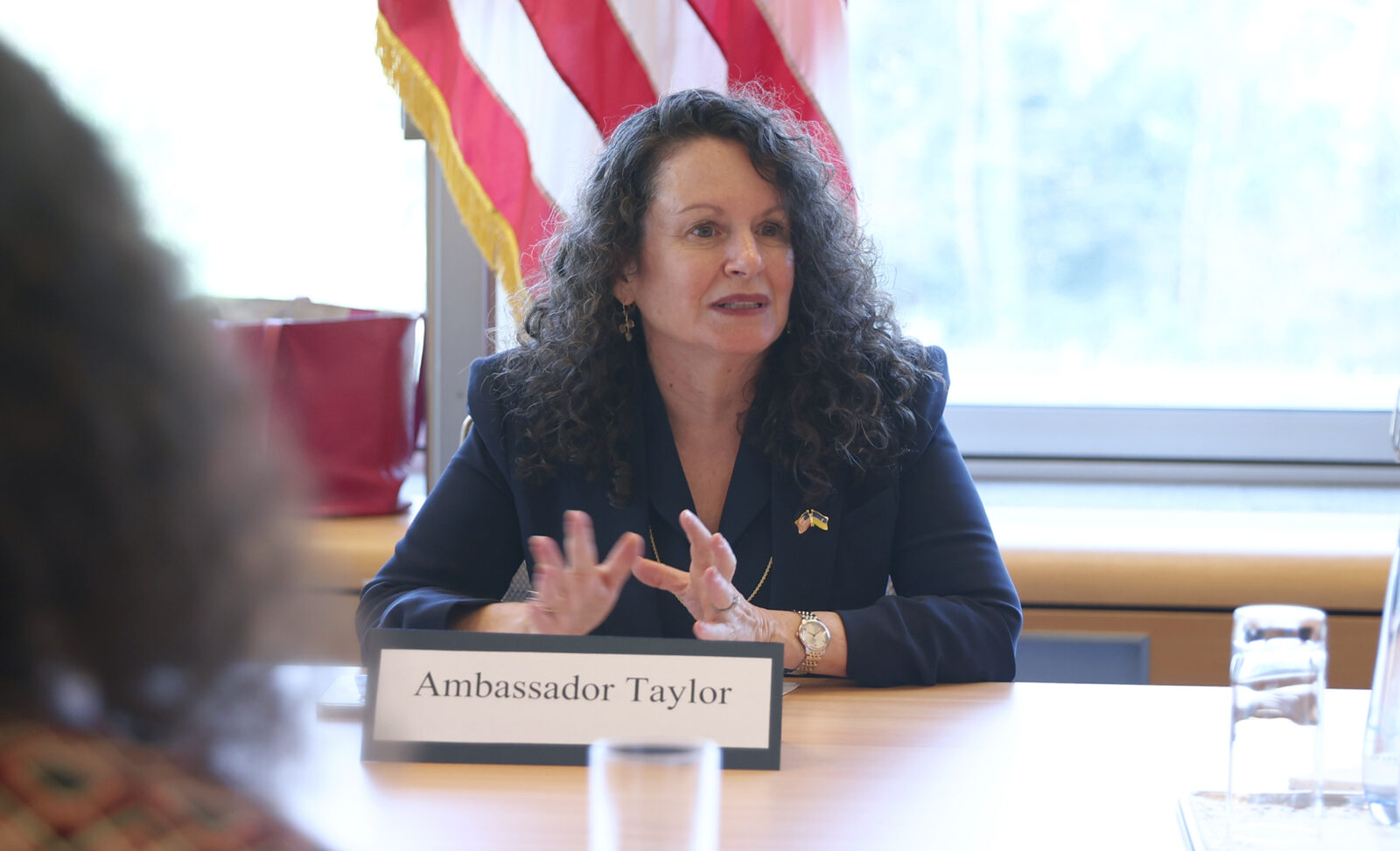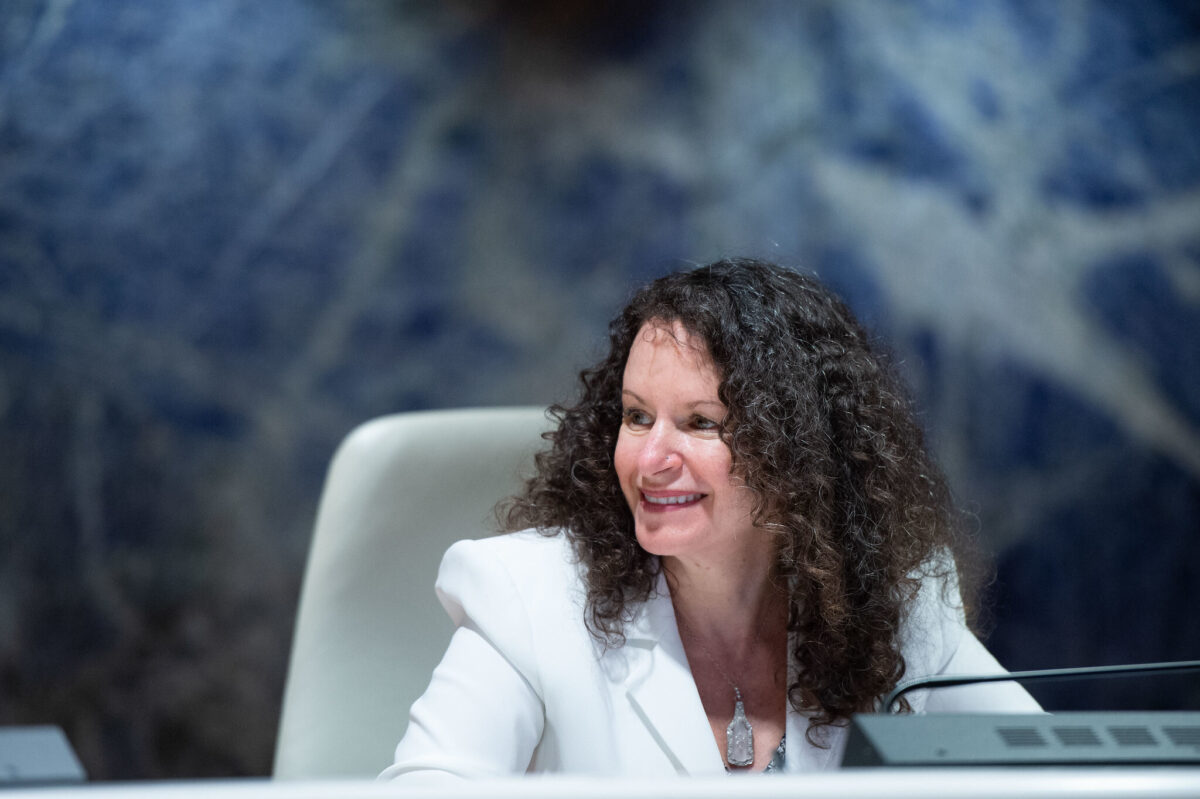
Eric Bridiers / U.S. Mission Geneva
In Geneva, an American ambassador makes the case for the U.N. Human Rights Council
The daughter of a Holocaust survivor, Ambassador Michèle Taylor thinks the U.S. needs to remain engaged on human rights matters on the global stage — even in a forum as imperfect as the United Nations
Michèle Taylor’s first day on the job as the U.S. ambassador to the United Nations Human Rights Council, on Feb. 24, 2022, began as a normal Thursday.
But by the time she went to bed that night, Russia had invaded Ukraine, and the entire international order in which she deeply believed — and that she had just been sworn in to try to uphold — was put to the test.
“It was a pretty auspicious start to my time here,” she said. “We all walked out when the Russian foreign minister addressed the Human Rights Council. We then had an urgent debate in the middle of that first week, and passed the first-ever resolution on a P5 country — Russia.”
The civil society activist from Atlanta is Washington’s first ambassador to the Human Rights Council since former President Donald Trump left the body in 2018, when he accused it of bias against Israel and a failure to hold human rights abusers to account. (China is a member of the body, and last year, amid Iran’s brutal crackdown against protestors, Iran served as chair of a council subgroup.) Early in his presidency, President Joe Biden announced that the U.S. would reenter the body.
“Our goals are clear: stand with human rights defenders and speak out against violations and abuses of human rights,” U.S. Ambassador to the United Nations Linda Thomas-Greenfield said in an October 2021 statement when the U.S. rejoined the Council. She pledged to keep human rights abusers off the panel, and to “oppose the Council’s disproportionate attention on Israel.”
In a recent interview with Jewish Insider, Taylor argued that the only way the U.S. can effectively fight the challenges posed by the council is by serving as an active member, engaging other nations diplomatically and speaking out on Israel’s behalf.
“If I do my job well, I will make it clear to even the biggest naysayers how important it is that the United States is engaged here at the Human Rights Council,” Taylor said. “We have plenty of evidence now as to what happens when the U.S. is here versus what happens when the U.S. is not here.”

In a June meeting about the council’s Commission of Inquiry (COI) on Israel and the Palestinian territories — an open-ended human-rights investigation that has been widely condemned by American lawmakers — Taylor read a joint statement, signed by 27 countries, demanding that the council shut down the COI, which she called an example of the panel’s “long-standing, disproportionate attention given to Israel.”
“We have been able to have that conversation, to point out the discrepancies and the way that Israel is treated, and change minds and change perceptions,” Taylor said, noting the five additional countries that had joined since the U.S. released a similar statement last year.
Had the U.S. been part of the council when it voted to establish the COI in May 2021, “we would have absolutely voted against the COI,” said Taylor. “With a voting voice, we also just have a different kind of influence in the room. But we weren’t even in the room at all.” Even with an American vote against establishing the COI, the effort would have passed.
Family history drives Taylor’s passion for human rights. Her mother and grandparents were Holocaust survivors from Vienna, though they mostly avoided speaking about their experiences during the war.
“The only real in-depth conversation that I would ever have with my mother about her memories and her understanding of what happened [was] just days before she died,” Taylor recalled.
She learned, from that conversation and others she pieced together over the years, that her grandfather — a proud Austrian who fought for the country in World War I — was meant to be arrested on Kristallnacht, but he had fled beforehand. She knew her mother was hidden in a cabinet before the family came to the U.S. in 1939. A relative was shot and killed in front of her mother; the blood splattered on the outfit of a baby who was in the room. That piece of clothing has since been donated to the U.S. Holocaust Memorial Museum in Washington, D.C. One cousin made it out on the Kindertransport, but the rest of Taylor’s family was murdered in the ensuing years.
“I’ve just always understood, from as long as I could understand anything, where hate and discrimination can and often do lead,” Taylor explained. “I think I have just always felt that I have a responsibility in having that knowledge to do what I can to help prevent that kind of atrocity, and specifically genocide, from happening elsewhere, and to other groups of people.”
Former President Barack Obama appointed Taylor to serve as a member of the United States Holocaust Memorial Museum Council, the museum’s governing body. She has also served on the Southeast Regional Board of Directors of the Anti-Defamation League and on the board of directors of the National Center for Civil and Human Rights in Atlanta.
“I have always felt an obligation to contribute to my own community,” Taylor said. “That commitment goes well beyond the Jewish community. When I hear the words ‘never again,’ to me, they mean to anyone.”

A longtime Democratic donor, Taylor was an early supporter of Biden’s campaign. In the fall of 2019, she was a founding board member of a super PAC supporting him.
“The president knows me very well, and he knows that my personal bent is to lean in and to engage whenever possible, even when it comes to really hard and challenging conversations where we might have very little agreement,” she said. Such diplomatic engagement is crucial, Taylor argued, on a body that she believes can do a lot of good, but that is also far from perfect.
Taylor pointed to one such balancing act — her continued consultation with Human Rights Watch, “one of the organizations that we engage with on a wide variety of topics that we agree on,” she said, while also criticizing the organization for its approach to Israel.
In recent years, senior Biden administration officials, top lawmakers on Capitol Hill and major American Jewish organizations have criticized HRW for referring to Israel as an apartheid state. But Taylor said that isn’t reason enough to ditch the organization entirely.
“We can still disagree on the perspective of the way that Israel is treated and the word ‘apartheid’ and even still have really productive conversations about how to promote peace and hopefully someday even work toward a two-state solution,” she noted.
Ultimately, Taylor argued, the people who would prefer the U.S. to leave the Human Rights Council are “leaving Israel alone in the room,” she said, “without the ability to call a vote, without the ability to potentially introduce things at the council that would be beneficial to supporting Israel.”
Israel, for its part, has never expressed much confidence in seeing positive change at the Human Rights Council.
“Change is very slow,” Ambassador Meirav Eilon Shahar, Israel’s representative to the U.N. in Geneva, told JI in 2022. “This is a bubble and reality doesn’t often knock on the door. But we are trying to make sure it does.”


